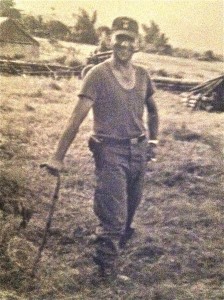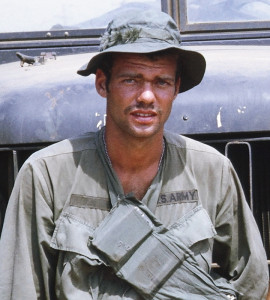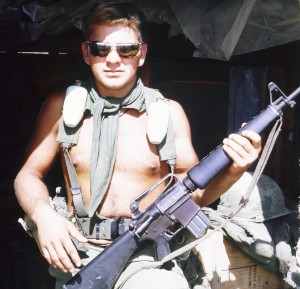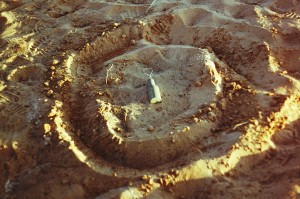The Boys of Battery B
Ernie Dublisky
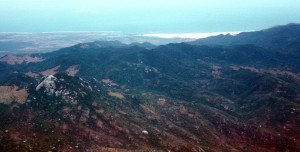
When I came to Vietnam I was delivered to Phan Thiet from Saigon. We were assigned to the First Field Forces, but we were further assigned to the 101st Airborne and were authorized to wear the 101st patch on our right shoulder.
Talk about weird, the organization of the 5th battalion was like a composite division artillery. We had three 105 batteries, a 155 battery, an 8 inch/175 battery, a battery of air defense weapons, 50 caliber and 40 mm, we had our own met section, we had our own counter-mortar radar section, and a search light section. We were spread out from Qui Nhon to Nha Trang.
At Nha Trang we had two guns, which by the way were out of B battery permanently at Nha Trang for defense of the airfield. When I got there Lt. Rich Sinnreich, a West Pointer, was in charge of those two guns. He retired a full colonel and is a well known military writer.
Then there was the rest of the battery. At the time I commanded there were no firebases. We went where we had to go and created gun positions where we had to create them. So you moved all over the Central Highlands around Qui Nhon and Nha Trang; that was essentially the central part of the country. There were no firebases, which I’ve always been thankful for. We kind of looked at firebases as a boring setup. You didn’t get to see any of the country.
The battalion was spread out over a huge area and we went all over the place. We moved from operation to operation, and area to area. We supported the Korean White Horse division, the Korean Tiger division, the Korean Marine brigade, the 22nd ARVN division, the 1st Cavalry division. It was set up I thought very smart. It was an area thing. Anybody who came into our area we supported. They picked us up as their artillery support.
It was near the Cross Road (west of Tuy Hoa) just before my time that Marsh was killed in a mortar attack. A part of that event that I thought was kind of funny – not funny but we all laughed about it – a Medevac helicopter that was taking guys who had been hurt in that attack down to the hospital in Nha Trang crashed in the sea. Can you imagine? Here you are wounded and all of a sudden you’re in a helicopter crash. I wasn’t there so I was able to laugh about it. I’m sure those that went through it weren’t laughing.
Other batteries lived in tents pitched above the ground. We used to laugh that some guys got Purple Hearts because when they ran out of their tents at night they ran into the tent ropes and tripped on the stakes. Before I got there B battery was so poorly trained they knew they were liable to a mortar attack, but still they had tents pitched up above the ground. From the whole time I was with the battery we dug in and nobody got hurt.
At one time we had a typhoon come through. We were just west of Tuy Hoa up on a ridge, I’ll never forget it. We’d dig in and then put the these Yukon tents, small conical things, over the hole. I was under one of these Yukon tents, and it rained so hard that it just came right through the tent. It was like being in a waterfall. All the canvas was ruined. I had an ammo sergeant who was a scrounger, everybody has a scrounger. I got ahold of him and said, Hey, I want you to go down to Tuy Hoa airfield, and you get yourself on an Air Force aircraft. I don’t care where you have to go, but you go find new tentage for the battery. And he did. He had all new tentage for the battery.
It’s amazing. I’ve always thought afterwards when I think about the things we did, if you had the right talent you’re going to have a great battery. If you have a good scrounger, you’re gonna have a good battery.
There’s a funny story about General Boatwright’s deputy. He had a reputation as a prick. Nobody wanted to see him comin’. By that time I had a new first sergeant, his name was Shepard, and we were waiting at the helipad where this guy’s helicopter would come in on an inspection. I heard this Sergeant Shepard say, “Crash, you son of a bitch, crash.” (laughs) I thought that was hilarious. By the way, I ran into Shepard years later in Germany. This guy probably was a drunk when he was a first sergeant in Vietnam. He was drunk in Germany and got into all kinds of trouble. I was sorry for him because of our Vietnam experience together.
Munnelly told me to ask you some questions.
About the rice! I don’t know how it was brought to my attention, one of my cooks or somebody, he said, “We only got ten pounds of rice to feed the battery.”
I didn’t know anything about the standards. I said, “Ten pounds to feed 110 guys? Come on. You gotta be kiddin’ me.” So I went to Munnelly complaining loudly about the ten pounds. He brought in the S4 warrant officer. They had this table there and it said so many men, and ten pounds was the authorized amount. It was very embarrassing to me because I had been so vociferously complaining about ten pounds of rice.
He tells the story of how you used the starlight scope.
Ah, I had forgotten that. Yea, we got a starlight scope, it was one of the first out in the field. So I set it up in the center of the battery where I could see the perimeter. At night I used it to check the perimeter, the guys on the outposts. One night I’m checking the perimeter and there’s this guy with no shirt on. We were in a malarial area and we had to wear shirts, and at night we had to put our sleeves down. I picked up the telephone, I called his outpost and said, “Put your shirt on.” And I’m watching the guy, and he starts looking around thinking, How could anybody possibly know I’m out here with no shirt on? I watched him and he put his shirt on, but that guy thought there was a ghost.
I heard you could read the name patches off the uniform shirts.
Oh yeah, it was a weird green light but you could actually see.
We had a moustache growing contest. Guys were growing moustaches and they were in various states of disrepair, and they were getting to being pretty crappy looking. I got the battery together and said, “OK guys, we are going to have a moustache growing contest. The winner will be allowed to keep his moustache and everybody else will have to shave theirs.” My driver, a guy named Schacherl, he won and was allowed to keep his moustache. Everyone else had to shave his moustache, including me.
Schacherl later was injured. We were evacuating a position and when we evacuated positions in those days we’d pile up all the trash in one big pile and burned it. Schacherl threw some gasoline and there were embers in there and it flashed up and burned him so badly that he had to be medevac’d all the way to a hospital in Japan. But I saw him at a reunion many years later and he didn’t have any major problems.
I had a Vietnamese man, an old man, who was my batman. That’s from the British Army, a batman is a valet. I had this Vietnamese man that we paid, and he was my batman. He used to clean my weapon, he’d set up my hooch, and stuff like that.
This was when you were back at battalion.
No, he traveled with us.
You were a battery commander out in the field, and you had a valet?
Well, that’s what I called him (laughs). He was an employee, and his job was to take care of me. I didn’t have time to take care of myself. He cleaned my weapon, he set up my hooch whenever we moved, did all those little things that a valet would do.
I lost him for a long time to malaria. He came down with bad case of malaria, and I felt so sorry for him. It’s a terrible disease. I lost him for quite awhile. He finally came back and I was in good shape again.
I’ll tell you what we did that I’d never seen done, that I really liked to do. We had these defensive concentrations, direct fire defensive concentrations. Where we were was kind of mountainous terrain, and we were usually in valley. So there’d be a series of hills around us and there would be some natural approaches to the battery that you would want to have a defensive concentration on. So when it was daylight the gun chief would lay in a concentration point on a trail coming down the mountain, direct fire, mark it on the howitzer, chalk it on the howitzer, the data to that point. Periodically through the night he would fire these defensive concentrations. They were like a few hundred meters away from the battery. What a noise that made, that crack! I used to like that.
I remember a mission where B battery at night … let me get this right … a howitzer on one side of the battery misheard a command and the data they put on the gun was 3200 mils out (180 degrees). In other words it was exactly the opposite of what it should have been. It was because of procedures we used at that time. We used to precede the firing command with either LEFT or RIGHT … I have forgotten how all this went exactly. But one gun misheard the orientation and pointed in the opposite direction. So what we had was five guns shooting in the right direction and one gun shooting the opposite direction god knows where. It turned out this gun was firing in the direction of an Engineer unit down the road. Each time an adjustment command was placed on the guns, this one gun went closer and closer toward the Engineers. They started to scream that they were receiving in-coming. We eventually figured out it could only have been us, because we were the only unit firing. We were able to stop it and nobody got hurt. It was close. I remember it happened at night, so all you could see was the flash at night and you didn’t really know what direction the tube was pointing.
The 4th Division came in and we were their sponsor unit. We did everything we could to help them get oriented. The B battery commander of the 29th Field, which was the battalion we were sponsoring, the first time he went into the field, he was sitting in his jeep with his vest on and it was open. A sniper shot him right through the heart. You know we didn’t have any kind of casualties like that. We didn’t have anybody killed. Then all of a sudden this guy comes in, his first time in the field, and BAM. That’s fate.
It very ironic for me, because my first tour in Germany I took the 3rd Armor Division to Germany to relieve the 29th Field of the 4th Armored Division. And then in Vietnam at Tuy Hoa when the 4th Division came into Vietnam, the 29th Field Artillery was the unit that came in our area.
In my whole Army career I’ve only been so pissed off at an officer one time that I relieved him on the spot and kicked him out of my unit, and eventually out of the Army. My Fire Direction Officer in B battery … I’ve forgotten the guy’s name … we were conducting a registration and we were in the middle of an operation. In the middle of an operation a registration is a hell of a lot more important that it would be routinely. Well, I didn’t discover, because we were in an operation, I was in the FDC listening and watching, and I discovered that this guy did not know what he was doing. He was completely screwing up the registration. I got so pissed off that I relieved him and had him sent out of the battery. And I think he was eventually sent out of the battalion. That would have been in ’66. Well in 1970 I got back to Ft. Sill after a tour in Europe. I went from Vietnam to Europe and back to Ft. Sill. On the post staff is an ordnance officer. This guy, he was now an ordnance officer. In other words, he couldn’t make it as a field artillery officer, so he branch transferred to Ordnance while he was still in the Army. I relieved one guy in my whole 22 years as a commissioned officer, and it was that guy.
Then John Munnelly, damn him, came up to me one day. You know John is a logistics guy; that’s his thing, logistics. He was desperate for an S4. So he comes to his favorite battery commander and says, “I want you to take over service battery and become my S4.” So I did. First of all, number one, any artillery officer who wants to be an S4 is out of his goddamn mind. But I really loved the guy and he was desperate for an S4 so I did it. And I hated it. I used to go out on the helicopters and make the deliveries just to get out.
Did you get back to B battery much?
The one time I was pleased to get back to B battery, they were up on a mountain somewhere out in the boonies. They had been put in in fair weather, and the weather changed drastically. It must have just slipped into monsoon or something, because they were wet and they were cold. We went out and scrounged up sweaters. It was pretty had to find sweaters in Vietnam.
I don’t think I ever saw one.
We went out and scrounged up sweaters and I flew all day long in a Chinook helicopter delivering stuff out to the battery. I remember this because at the end of the day, since I was the only one who knew where all the positions were, I would stand between the two pilots up under the front transmission and tell them where to go. Well, by the end of the day I was deaf, because of the noise from the transmission. I was literally deaf. I could not hear anything. When I got off the helicopter and I couldn’t hear I panicked, and they took me to the medics and the doctor said, “You’ll be alright, just wait awhile.” Within a couple hours my hearing came back. I remember that so well because it was so scary. So that was when I got back to B battery.

